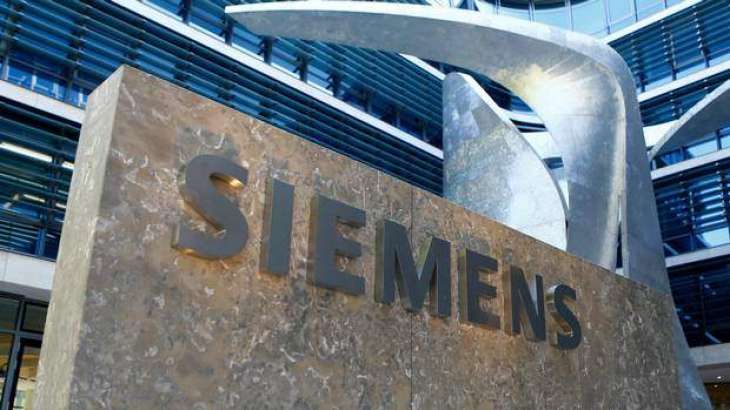The European Commission's ban on the rail merger between France's Alstom and Germany's Siemens was sharply criticized by Berlin and Paris, but welcomed by some of their customers and trade unions
BRUSSELS (Pakistan Point News / Sputnik - 08th February, 2019) The European Commission's ban on the rail merger between France's Alstom and Germany's Siemens was sharply criticized by Berlin and Paris, but welcomed by some of their customers and trade unions.The two companies wanted to create a rail champion to compete effectively with Chinese CRRC rail giant. Siemens Alstom would have been listed in France, headquartered in Paris area and led by Alstom CEO Henri Poupart-Lafarge. However, Siemens would have had control over 50 percent of the shares of the new entity immediately and possibly more going forward. It would have been able to appoint six out of 11 board members.
According to European Commissioner for Competition Margrethe Vestager, the merger, rejected on Wednesday, would have led to higher prices and less choice in rail industry. The European Commission argued that Chinese suppliers were not extensively present on the European rail market and Chinese high-speed train producers were no threat to either Alstom or Siemens in "a foreseeable future."
French Prime Minister Edouard Philippe has called the commission's decision "a bad move" made "on wrong foundations." French Economy and Finance Minister Bruno Le Maire said it was a mistake, a blow to the European industry reinforcing the competition from outside players.
Le Maire argued Wednesday that the European Union needs a tweak to its competition rules to properly reflect the economic reality, adding that France and Germany would propose such changes.
His German counterpart Peter Altmaier similarly pointed to the need for a new industrial strategy and "strong European champions."
Jean-Michel Massart, a representative of CSC Metal, part of Belgium's Confederation of Christian Trade Unions, agrees with the commission's assessment that the threat of competition from Chinese companies is not that strong.
"Alstom even sells parts and sub-assemblies to the Chinese group! The Chinese would have to invest a lot to penetrate the European market, which is very unaggregated," Massart told Sputnik.
Massart suggested that European government should invest more in Buy European Act, once backed by French President Emmanuel Macron � a policy that would limit foreigners' access to public procurement deals.
Olivier Kohler, a representative of French CFDT union, believes that Alstom "must go through the development of economic interest groups (GEIE) with European partners in research and development, production, export."
GEIEs are legal entities that can be set up to help companies from different EU member states to work together.
Infrabel, the company that manages Belgium's rail infrastructure and is a client of both Siemens and Alstom, welcomes the ban on the merger.
"This merger would indeed have created a de facto monopoly situation, which European customers would have paid [for] directly, but which would also indirectly have affected our society and our entire economy," Arnaud Reymann, the spokesman for Infrabel, told Sputnik.
Trade unions in France and Germany had been watching merger preparations closely for fear of massive layoffs.
Juergen Kerner, managing director of IG Metall, major German union, welcomed the merger idea back in 2017, admitting that the competition with foreign companies was growing. However, Kerner, who is a member of the supervisory board of Siemens AG, insisted on several conditions, such as a ban on dismissals for at least four years after the merger and a four-year guarantee that employees can remain at their working sites.
Alstom site in Charleroi, Belgium employs slightly more than 1,000 people, who had plenty to fear from the merger that fell through, Romeo Bordenga, a representative of FGTB union told Sputnik.
"In a major restructuring, the industrial sites located 'on the periphery' of the group, in third countries, like us in Belgium, are the first to suffer layoffs and closures. The merging companies try to satisfy the unions in the two main countries, Germany and France," Bordenga said.
The union estimated that the merger would have cost between 3,000 and 7,000 jobs in Europe, according to the representative.
"Alstom has never given us any guarantee of employment. Siemens had given it, but only to the German workers," Bordenga added.
The workers do not believe that European companies are threatened by Chinese ones, rather, the companies want to optimize shareholders' profits, the union representative concluded.
FRENCH POLITICIANS' FEARS OF TAKEOVER ASSUAGED
French National Rally (RN) party is "pleased of the failure of the German Siemens to absorb the French Alstom, in the name of our national interest," a member of the party and of the European parliament, Marie-Christine Arnautu, told Sputnik.
French lawmaker Nicolas Dupont-Aignan, the head of Debout La France! movement, agrees that Alstom would have been "simply devoured by the Germans."
"We would enthusiastically defend an industrial alliance of equals ... The refusal of the Commission is an opportunity to put everything back on the table to work on a new project," Dupont-Aignan told Sputnik.
At the same time, Dupont-Aignan believes that the European Commission "was afraid that the European champion would be too strong."
"Brussels punishes European countries but protects our foreign competitors," Dupont-Aignan said.
COMMISSION REFUSES TO 'PLAY FAVORITES'
Jean-Claude Juncker, the president of the European Commission, said Tuesday, ahead of the official decision to block the merger, that the commission would not "play favorites."
However, whatever proposals on competition France and Germany bring forward, they are likely to be considered by a new commission, the one formed after European elections set for May.
Manfred Weber, a candidate for Juncker's job from one of the major groups in the European parliament, blasted the commission's ruling.
"When our companies have to compete with giants double their size, only European champions have a chance in the world's economy," Weber said on Twitter.
For Weber, "an ambitious Europe" is the one that protects "European companies and jobs."




